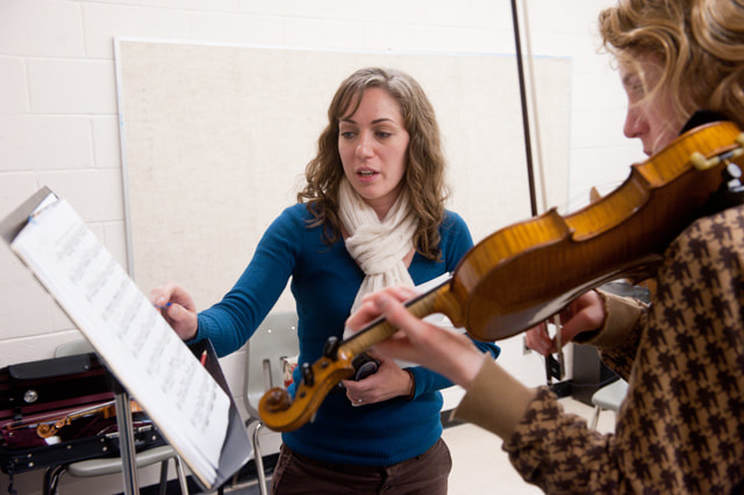Every Child Can Learn
The Suzuki philosophy believes that every child can learn to play an instrument and focuses on educating the entire child through the study of music. Life lessons such as focus, discipline, self-evaluation, and expression are emphasized in all that is done during class and will be accessible to the child in other areas of his or her life. Formal instruction usually begins around age 4. Since children learn from their environment, Suzuki lessons emphasize daily active listening to music from a very young age. Music is first taught "by rote" just as an infant would learn his or her "mother tongue" (listening, observing, imitating). As students progress, they learn to read music and are assigned etudes, scales, and repertoire so that they are competitive in the field.
Parental Involvement
The Suzuki approach centers on the relationship between child, parent, and teacher. This is referred to as the Suzuki triangle. Suzuki parents are asked to take notes during lessons and recreate the lesson at home each day when the child practices. Parents are also responsible for encouraging and guiding the practice time and offering feedback to the teacher about how the week progressed. (Students who are 12 years or older and show proficient practicing may practice alone).
Learning With Others
Group class is another core component of a Suzuki education. This mandatory class is offered in addition to private lessons and is based on playing level. Students in these mixed age groups learn from each other and are motivated from the peer interaction. These classes emphasize important musical and social skills such as leading, following, and working with others, all while strengthening technique through consistent review. Advanced students study chamber music, music theory, and technique. Students share their musical accomplishments by performing in community recitals and concerts throughout the year.
Parental Involvement
The Suzuki approach centers on the relationship between child, parent, and teacher. This is referred to as the Suzuki triangle. Suzuki parents are asked to take notes during lessons and recreate the lesson at home each day when the child practices. Parents are also responsible for encouraging and guiding the practice time and offering feedback to the teacher about how the week progressed. (Students who are 12 years or older and show proficient practicing may practice alone).
Learning With Others
Group class is another core component of a Suzuki education. This mandatory class is offered in addition to private lessons and is based on playing level. Students in these mixed age groups learn from each other and are motivated from the peer interaction. These classes emphasize important musical and social skills such as leading, following, and working with others, all while strengthening technique through consistent review. Advanced students study chamber music, music theory, and technique. Students share their musical accomplishments by performing in community recitals and concerts throughout the year.

